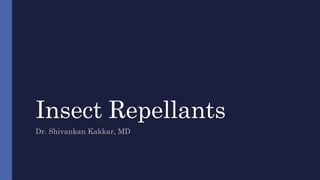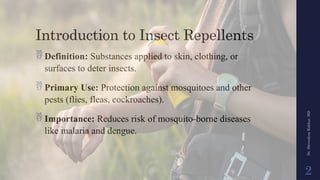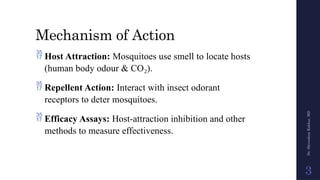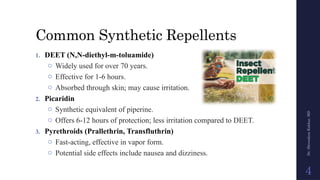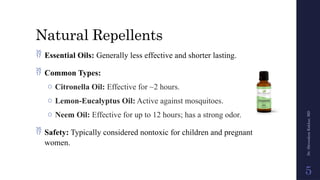Insect Repellents: Types, Safety, and Proper Use
- 1. Insect Repellants Dr. Shivankan Kakkar, MD
- 2. Dr. Shivankan Kakkar, MD 2 Introduction to Insect Repellents ’éĘ Definition: Substances applied to skin, clothing, or surfaces to deter insects. ’éĘ Primary Use: Protection against mosquitoes and other pests (flies, fleas, cockroaches). ’éĘ Importance: Reduces risk of mosquito-borne diseases like malaria and dengue.
- 3. Dr. Shivankan Kakkar, MD 3 Mechanism of Action ’éĘ Host Attraction: Mosquitoes use smell to locate hosts (human body odour & CO ). Ōéé ’éĘ Repellent Action: Interact with insect odorant receptors to deter mosquitoes. ’éĘ Efficacy Assays: Host-attraction inhibition and other methods to measure effectiveness.
- 4. Dr. Shivankan Kakkar, MD 4 Common Synthetic Repellents 1. DEET (N,N-diethyl-m-toluamide) o Widely used for over 70 years. o Effective for 1-6 hours. o Absorbed through skin; may cause irritation. 2. Picaridin o Synthetic equivalent of piperine. o Offers 6-12 hours of protection; less irritation compared to DEET. 3. Pyrethroids (Prallethrin, Transfluthrin) o Fast-acting, effective in vapor form. o Potential side effects include nausea and dizziness.
- 5. Dr. Shivankan Kakkar, MD 5 Natural Repellents ’éĘ Essential Oils: Generally less effective and shorter lasting. ’éĘ Common Types: o Citronella Oil: Effective for ~2 hours. o Lemon-Eucalyptus Oil: Active against mosquitoes. o Neem Oil: Effective for up to 12 hours; has a strong odor. ’éĘ Safety: Typically considered nontoxic for children and pregnant women.
- 6. Dr. Shivankan Kakkar, MD 6 Safety & Precautions ’éĘ Side Effects of DEET: o Skin irritation, insomnia, mood disturbances. o Neurotoxicity and seizures in rare cases. ’éĘ Usage Tips: o Avoid contact with eyes/mucous membranes. o Reapply as needed, but avoid overuse.

